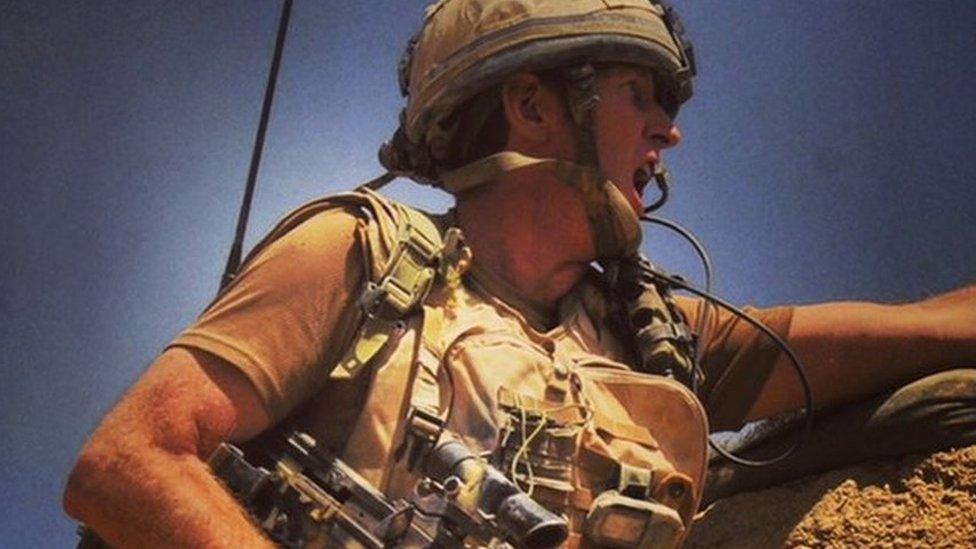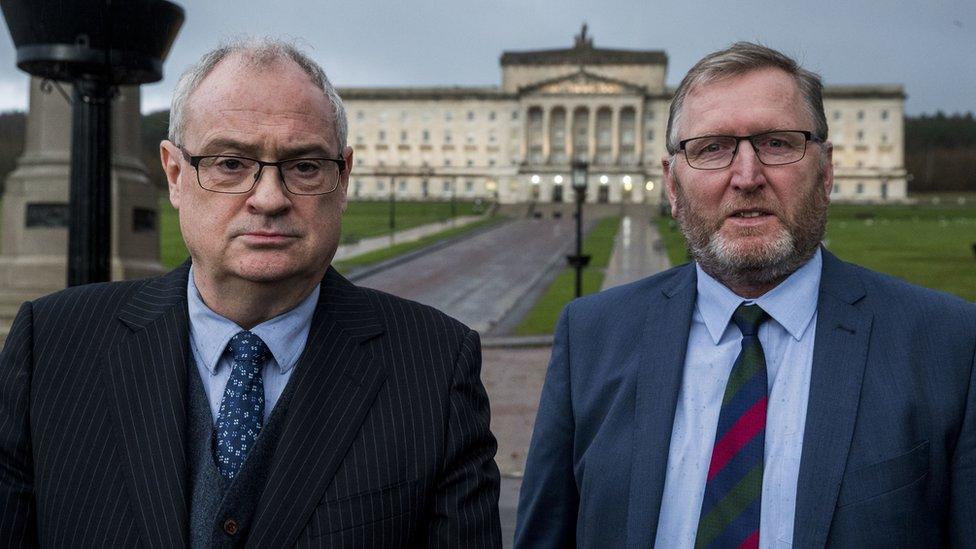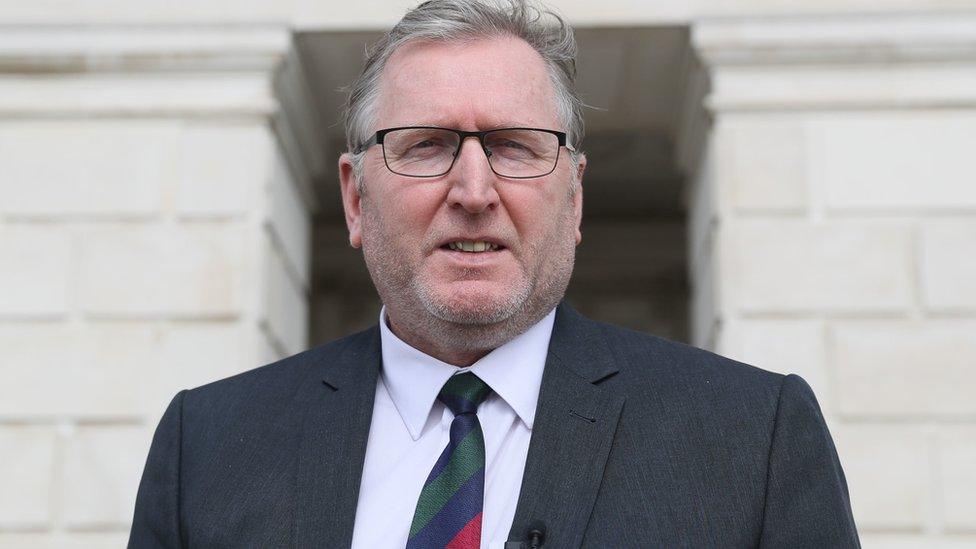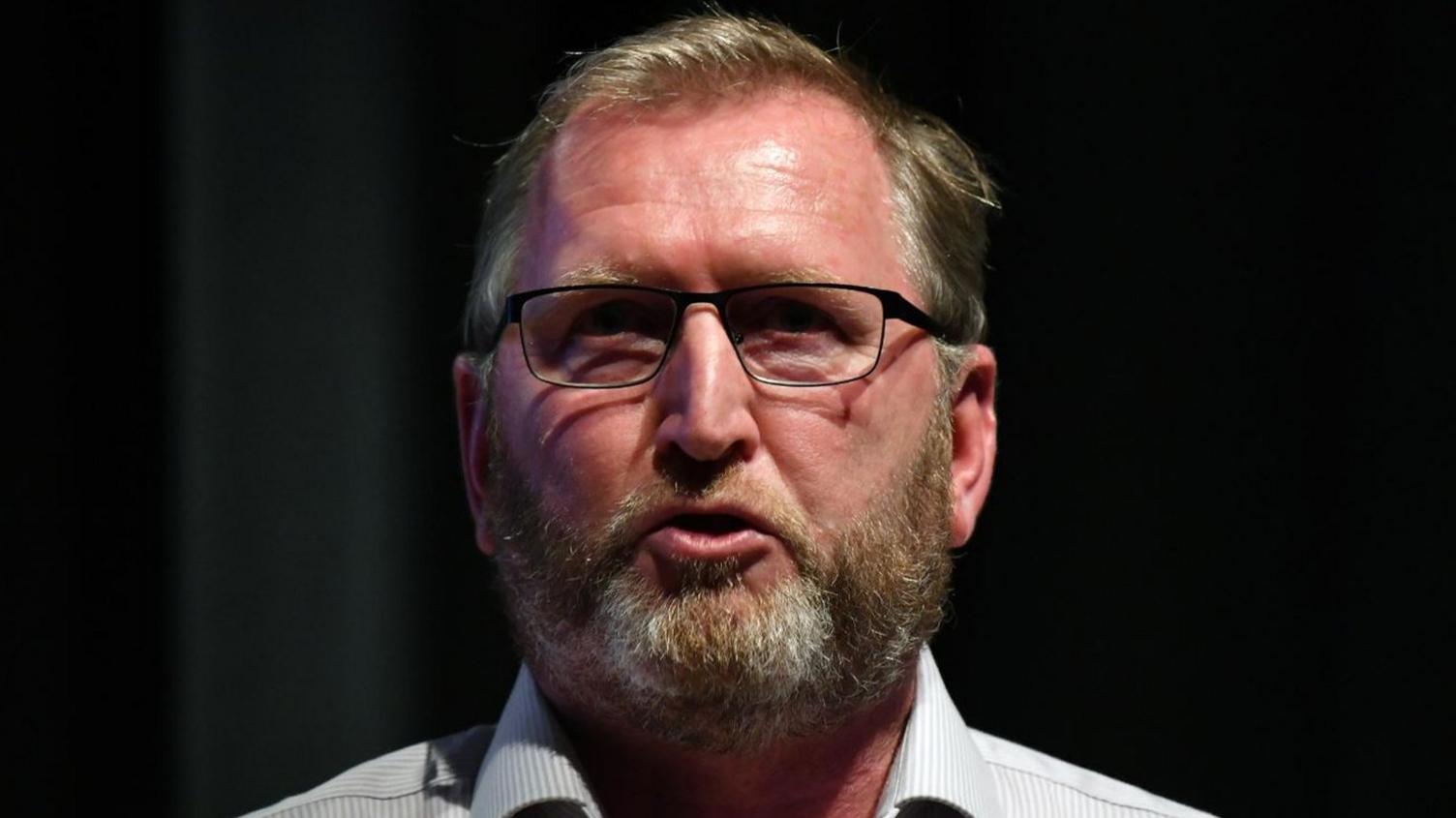Doug Beattie: Who is the new leader of the UUP?
- Published

Doug Beattie, a retired Army captain, says he is the right person to be able to "rekindle the fortunes" of the UUP
Doug Beattie once described himself as an "ordinary soldier" but he is no ordinary politician.
The next leader of the Ulster Unionists spent decades in frontline military service before moving into the battlefield of Northern Ireland politics.
He takes the helm of the party having been twice tipped for the job before but never took up the challenge.
The 55-year-old Upper Bann member of the Northern Ireland Assembly had been named as a potential leader in 2017 and 2019 - both times he opted not to run and supported Robin Swann and Steve Aiken respectively.
He argued that a leadership contest would have been a "distraction" from the wider issues of Brexit and elections.
However, Mr Beattie's time at the top has now come.
After Mr Aiken's resignation last week, Mr Beattie thanked him for his service, adding that the "loneliness of leadership is never easy".
Military background
Like Mr Aiken, who was a former Royal Navy submarine commander, Mr Beattie has a background in the armed forces and served as a soldier for 34 years.
Born into a military family, Mr Beattie and his five siblings were raised by their father, a warrant officer in the Royal Ulster Rifles, after the death of their mother at a young age.
At the age of 16, Mr Beattie followed in his father's footsteps and joined the Royal Irish Rangers.
He was soon posted to Berlin, where he guarded Adolf Hitler's former deputy Rudolph Hess in Spandau Prison.

Doug Beattie served three tours of duty in Afghanistan
Throughout his military career he served in Bosnia, Kosovo, Iraq and Northern Ireland and was awarded a Military Cross for bravery during operations to retake the town of Garmsir in Helmand, Afghanistan.
On his return from Afghanistan, Mr Beattie published the first of two books in 2008, An Ordinary Soldier, an account of the Garmsir mission and an insight into the relationship between British soldiers and the Afghans they served alongside.
The book was well received, launching him into the public eye.
He remains a captain in the Army Reserves, credentials which some political rivals would find hard to challenge.
Politics beckons
After retiring from the forces, Mr Beattie joined the ranks of the UUP and was elected to Armagh, Banbridge and Craigavon District Council for the Portadown area at the 2014 local elections.
Two years later he was elected to the office of MLA for Upper Bann, a seat he has held ever since.
However, the 2016 assembly election victory was horribly overshadowed by the tragic and sudden death of his grandson just days before.
Fifteen-month-old Cameron died in his sleep and was buried on the day his grandfather was elected.
Mr Beattie recently gave an emotional interview to The Nolan Show about his grandson.
Allow X content?
This article contains content provided by X. We ask for your permission before anything is loaded, as they may be using cookies and other technologies. You may want to read X’s cookie policy, external and privacy policy, external before accepting. To view this content choose ‘accept and continue’.
Last year, Mr Beattie, as well as Steve Aiken, Patsy McGlone of the SDLP and Alliance Party's Stephen Farry, received threats from the south-east Antrim Ulster Defence Association (UDA), a paramilitary group.
The four politicians had condemned the organisation for threats made to Sunday World and Sunday Life journalists.
Following the threat, Mr McGlone said it should be "roundly condemned", adding that Mr Beattie was "doing the job he was democratically elected to do" and paramilitaries "really are a plague on their communities".
Mr Beattie failed to secure a seat representing his constituency at Westminster in the 2019 general election, as the Democratic Unionist Party's (DUP) Carla Lockhart retained the seat for her party.
But he is regarded well within the party and by his political opponents, who view him as a strong media performer.
Beattie on Brexit
Announcing his bid to become leader, Mr Beattie said the Northern Ireland Protocol, the post-Brexit arrangements for Northern Ireland which placed a trade border in the Irish Sea, must be scrapped.
He said it was damaging to the Good Friday Agreement but he said the party had an alternative ready to go.

Upper Bann MLA Doug Beattie (right) has paid tribute to his leadership predecessor Mr Aiken (left)
"I do not want a hardened border on the island of Ireland, but neither do I want a border in the Irish Sea," Mr Beattie said.
He has also said he wanted to work with incoming DUP leader Edwin Poots, who has called for unionist pacts in the next assembly election to maximise the number of seats held by unionist parties.
Viewed as a moderate and progressive within the UUP, Mr Beattie recently proposed a motion in Stormont calling for a ban on gay conversion therapy "in all its forms".
The non-binding motion, which passed by 59 votes to 24, argued it is "fundamentally wrong" to view the LGBTQ community as needing a "fix or cure".
"There is no therapy that would make me a gay man so why would we say that a gay man can be fixed or cured?" he asked, describing conversion therapy as "humiliating".
He said the motion was not about stifling religious freedom but about banning a "harmful practice".
It is likely a UUP under Mr Beattie's leadership would focus on reclaiming some of the party's centre-ground votes which they have lost to the Alliance Party in recent elections.
He has said he recognises the UUP's fortunes have slipped in recent years and he wants to revive and reform the party.
But can he go where his predecessors have failed, and convince the wider Ulster Unionist membership to support any changes he hopes to make?
Related topics
- Published11 May 2021

- Published10 May 2021

- Published14 October 2019
